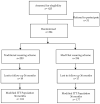The Effect of Weaning with Adult Food Typical of the Mediterranean Diet on Taste Development and Eating Habits of Children: A Randomized Trial
- PMID: 35745216
- PMCID: PMC9227033
- DOI: 10.3390/nu14122486
The Effect of Weaning with Adult Food Typical of the Mediterranean Diet on Taste Development and Eating Habits of Children: A Randomized Trial
Abstract
Mediterranean Diet (Med Diet) is one of the healthiest dietary patterns. We aimed to verify the effects of weaning (i.e., the introduction of solid foods in infants previously fed only with milk) using adult foods typical of Med Diet on children eating habits, and on the microbiota composition. A randomized controlled clinical trial on 394 healthy infants randomized in a 1:1 ratio in a Med Diet group weaned with fresh; seasonal and tasty foods of Med Diet and control group predominantly weaned with industrial baby foods. The primary end point was the percentage of children showing a good adherence to Med Diet at 36 months. Secondary end points were mother’s changes in adherence to Med Diet and differences in children gut microbiota. At 36 months, children showing a good adherence to Med Diet were 59.3% in the Med Diet group and 34.3% in the control group (p < 0.001). An increase in adherence to the Med Diet was observed in the mothers of the Med Diet group children (p < 0.001). At 4 years of age children in the Med Diet group had a higher gut microbial diversity and a higher abundance of beneficial taxa. A Mediterranean weaning with adult food may become a strategy for early nutritional education, to develop a healthy microbiota, to prevent inflammatory chronic diseases and to ameliorate eating habits in children and their families.
Keywords: Mediterranean Diet; complementary feeding; fresh foods; gut microbiota; taste development.
Conflict of interest statement
The authors declare no conflict of interest.
Figures





References
-
- Furman D., Chang J., Lartigue L., Bolen C.R., Haddad F., Gaudilliere B., Ganio E.A., Fragiadakis G.K., Spitzer M.H., Douchet I., et al. Expression of specific inflammasome gene modules stratifies older individuals into two extreme clinical and immunological states. Nat. Med. 2017;23:174–184. doi: 10.1038/nm.4267. - DOI - PMC - PubMed
Publication types
MeSH terms
LinkOut - more resources
Full Text Sources

